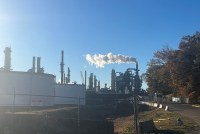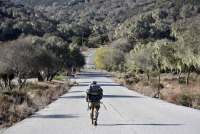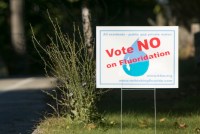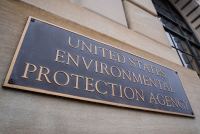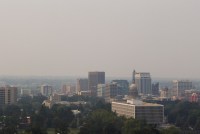Latest KFF Health News Stories
After a Child’s Death, California Weighs Rules for Phys Ed During Extreme Weather
A California lawmaker wants the state to craft guidelines for how and when schoolchildren can play or exercise during extreme weather, including heat waves. The bill comes after a 12-year-old boy died after a physical education instructor told him to run as the temperature topped 90 degrees.
Could Better Inhalers Help Patients, and the Planet?
Puff inhalers can be lifesavers for people with asthma and other respiratory diseases, but some types release potent greenhouse gases that contribute to climate change. That, in turn, worsens wildfires, contributes to air pollution, and intensifies allergy seasons — which can increase the need for inhalers. Some doctors are helping patients switch to more eco-sensitive inhalers.
Journalists Delve Into Climate Change, Medicaid ‘Unwinding,’ and the Gap in Mortality Rates
KFF Health News and California Healthline staffers made the rounds on national and local media this week to discuss their stories. Here’s a collection of their appearances.
AC, Power Banks, Mini Fridges: Oregon Equips Medicaid Patients for Climate Change
Oregon is giving Medicaid patients air conditioners and other equipment to help them cope with soaring heat, smoky skies, and other dangers of climate change. Oregon health officials hope to show other states and the federal government that they can save lives and money.
The Neglected U.S. Victims of Agent Orange
The Department of Veterans Affairs has long given Vietnam veterans disability compensation for illness connected to Agent Orange, widely used to defoliate Southeast Asian battlefields during the U.S. war. Less well known: The powerful herbicide combination was also routinely used to kill weeds at domestic military bases. Those exposed to the chemicals at the bases are still waiting for the same […]
Toxic Gas Adds to a Long History of Pollution in Southwest Memphis
People across the nation claim cancer-causing emissions from local sterilizing plants are making them sick. It’s an example of environmental racism, say residents of one predominantly Black area in southwest Memphis, Tennessee, where life expectancy is much shorter than county and state averages.
Exposed to Agent Orange at US Bases, Veterans Face Cancer Without VA Compensation
The Department of Veterans Affairs has long given vets who served in Vietnam disability compensation for illness connected to Agent Orange harm. But those exposed at U.S. bases are still waiting for the same benefits.
Tire Toxicity Faces Fresh Scrutiny After Salmon Die-Offs
Tires emit huge volumes of particles and chemicals as they roll along the highway, and researchers are only beginning to understand the threat. One byproduct of tire use, 6PPD-q, is in regulators’ crosshairs after it was found to be killing fish.
Neumáticos tóxicos están matando a los peces. ¿Qué pasa con los humanos?
Durante décadas, las preocupaciones sobre la contaminación automovilística se han centrado en lo que sale del tubo de escape. Ahora, investigadores y reguladores dicen que se necesita prestar más atención a las emisiones tóxicas de los neumáticos mientras los vehículos circulan por las carreteras.
Newsom Offers a Compromise to Protect Indoor Workers from Heat
After rejecting proposed rules to protect millions of workers in sweltering warehouses, steamy kitchens, and other hot workplaces, California Gov. Gavin Newsom’s administration has offered a compromise to allow the protections to take effect this summer. But state and local correctional workers — and prisoners — would have to wait even longer.
Más condados prohíben el fluoruro en el agua potable. Cómo afecta a la prevención dental
En los últimos años cientos de comunidades han dejado de agregar fluoruro a sus suministros de agua o han votado para evitar agregarlo, a pesar que la ciencia dice que ese nutriente ayuda a la salud dental y previene gastos en tratamientos dentales.
As Bans Spread, Fluoride in Drinking Water Divides Communities Across the US
The broad availability of over-the-counter dental products containing fluoride has some community leaders arguing that its addition to public drinking water is no longer necessary. But public health experts worry that, much like vaccines, fluoridation may be a victim of its own success.
Heat Protections for California Workers Are in Limbo After Newsom Abandons Rules
Proposed rules to protect millions of workers from potentially dangerous heat inside workplaces are dead after Gov. Gavin Newsom’s administration refused to sign off. Labor advocates and state regulators are calling for emergency regulations before temperatures soar this summer.
Move to Protect California’s Indoor Workers From Heat Upended by Cost Questions
A years-long process that would have created heat standards for California workers in warehouses, steamy kitchens, and other indoor job sites catapulted into chaos Thursday when Gov. Gavin Newsom’s administration pulled its support. Regulators, saying they felt “blindsided,” approved the regulation anyway. It’s unclear what happens next.
A New Orleans Neighborhood Confronts the Racist Legacy of a Toxic Stretch of Highway
New federal funds aim to address an array of problems created by highway construction in minority neighborhoods. These are economic, social, and, perhaps above all, public health problems. In New Orleans’ Treme neighborhood, competing plans for how to deal with harm done by the Claiborne Expressway reveal the challenge of how to mitigate them meaningfully.
Toxic Gas That Sterilizes Medical Devices Prompts Safety Rule Update
The Environmental Protection Agency is tightening regulation of ethylene oxide, a carcinogenic gas used to sterilize medical devices. The agency is trying to balance the interests of the health care industry supply chain with those of communities where the gas creates airborne health risks.
Back From COP28, California Climate Leaders Talk Health Impacts of Warming
Three leading California officials who represented the state at the United Nations climate talks late last year reflect on climate change’s growing threat to human health — and explain what the state is trying to do about it.
As climate change-driven wildfires increasingly choke large parts of the United States with smoke each summer, new research shows residents in long-term care facilities are being exposed to dangerously poor air, even those who don’t set foot outside during smoke events.
Climate Change Raises Pressure on Biden To Keep Workers Cooler
With climate change posing rising threats to human health, the Biden administration is drafting federal rules to protect construction crews, warehouse workers, delivery drivers and the rest of America’s workforce from extreme heat. The regulatory effort has been years in the making, and its fate is far from certain. The Occupational Safety and Health Administration […]
‘Forever Chemicals’ Contaminate America’s Freshwater Fish
Gone fishing? Depending on the lake, your catch may not be safe to eat. A group of chemicals collectively known as PFAS are found in hundreds of consumer goods, including dental floss, rain jackets and nonstick cookware. Over decades, these chemicals have spewed from manufacturing plants and landfills into local ecosystems, polluting surface water and […]








